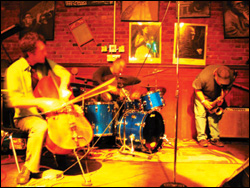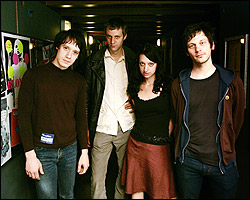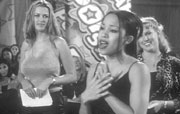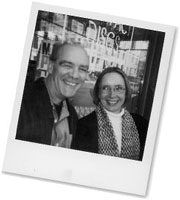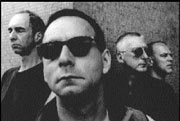Genre names are a bitch. But Wally Shoup, the saxophonist whose 1981 LP Scree-Run Waltz was one of the first free- improv recordings to be independently produced in America, avoids naming his by referring to the maze of sounds as “this music.”
“Part of the decision making while we’re playing this music is that you can go against what’s going on,” he says.
And: “A lot of this music does come from a sort of disgruntlement on the part of the musicians who don’t want to be told what to play next.”
And: “There’s a rhythm in most popular music that’s standard. And this music says we’re not going to limit ourselves to that.”
Although I’m sure I understand what he means, I finally interrupt to ask just what “this music” is.
“It’s music that you get,” he tells me. “The way you get a joke. It’s not a kind of music, it’s a way to make music. When I say ‘this music,’ I mean ‘this game,’ this way of getting with other people and making music.”
As if to cement Shoup’s terminology, Brent Arnold, the cellist you hear on just about every Up Records with a cello on it— including his own—and one of the musicians whom Shoup regularly “gets with” in the trio Project W, uses the term, too.
“When you play this music, you’re breaking a lot of patterns,” says Arnold. There might be a pattern in the way these guys speak, but the only pattern you’ll find in their music is the lack of patterns.
Shoup’s latest release, Confluxus (on the U.K.’s Leo Records and available at Wall of Sound, Bud’s Jazz Records, and Playback), which features Arnold and Philadelphia percussionist Toshi Makihara, begins with “Two Breaths Away,” a piece with very little in the way of predictability but plenty of reason. Shoup’s alto sax sings straight out of the gate, while Arnold’s cello argues in a low, serious, melodic tone. Makihara’s drums skip like bright light bouncing through tree branches. Soon, Shoup’s blowing, still sailing, begins arguing. The drums start to bang; cymbals slap the air. Arnold’s cello is shrill and angry for a moment, then quickly regains composure. It’s a conversation—spontaneous, unplanned, and prone to lulls and fits as all conversations are—between the musicians. One party tries to hold a smile, the next shakes his head, and the last talks over their voices. Although the remaining nine pieces are of similar stock, there is no outline binding them together. Each one is singular. Everything that Shoup and his cohorts play is singular. Each conversation happens just once. This, too, is what “this music” means.
“When I first started playing improvised music in the ’70s, there was no audience for it,” says Shoup. “It was Colorado during the ‘Rocky Mountain High’ time, and it was like, ‘Let’s shake these fuckers up.’ We had a punk attitude and I didn’t even know what punk was. Now I don’t have nearly that same attitude. I’d rather just play in as many settings as I can and not have any sealed off.”
But Shoup, who has lived in Seattle since 1985, recognizes that isn’t easy. “I like to think that anyone can get this,” he says, “but I imagine that for some people who hear us, they’re going, ‘What are these people doing? It makes no sense.'” In Project W, Shoup and Arnold made a decision to seek and succumb to each piece’s inherent end—and typically that isn’t 19 long-winded minutes into it. This is one way that they’re attempting to make improvised music make a little more sense.
“You can do that,” explains Shoup, “and not compromise the spirit of the music—which is not necessarily about determining what an audience wants from you; it’s almost the opposite of that. It’s almost like we’re going to make a pact with the audience that they’re going to follow us wherever we go.”
“If you say ‘improv music,’ in terms of the world, that’s really most music,” says frequent Project W percussionist and musical academic Greg Campbell. “Most of the world’s music has some degree of improvisation.” But most of the world is not as distracted as we are by MTV and American Idol. Maybe this is why improv music has often been able to find an audience with punk and DIY fans, as Project W did when they were asked by Thurston Moore to open for his band, Sonic Youth, in Seattle in 1998. Their Obliquity (Shrat Field) was recorded at that show, and for months after its release in 1999, sales at the now defunct Fallout Records, Capitol Hill’s garage-punk emporium, kept the record on its top-five list. Shoup himself talks more about the Stooges than Ornette Coleman.
“Obviously, music is something besides chords and melodies, things you can write down on paper—I hope it is,” says Arnold. “If you don’t rely on that to fall back on, what’s left?”
What’s left can be silence, it can be truly “alternative” rock, or it can be the freest jazz in the union. With nothing to fall back on—no hit songs, no hooks, not even a static “band”—what’s left is constantly new.
Wally Shoup Trio play CoCA with Michael Moore and Philip Greenlief at 4 p.m. Sun., June 20. $8/$5 for CoCA members.
